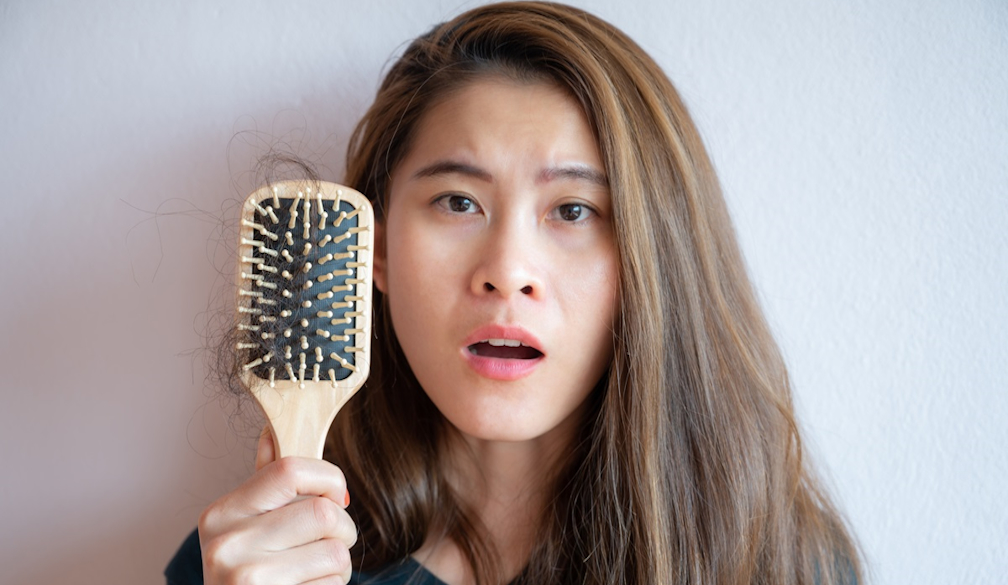Surprising Causes of Hair Loss You Might Not Know About

Australians, like anyone else, may face hair loss due to genetics, but it’s the unexpected culprits (things like nutrient deficiencies, stress, medications and infections) that often catch people off guard.
In this article, we’ll be discussing a list of possible causes of hair loss that you probably haven’t thought about. When you know the full range of possible causes, it becomes much easier to tackle hair loss from all angles.
It could be through diet, lifestyle changes, medical treatments or advanced solutions like Scalp Micropigmentation (aka SMP); no matter your situation, there’s a pathway to healthier hair that might work best for you.
Nutrients Deficiencies
You probably must have heard someone say, "You are what you eat"? Well, it turns out, your hair takes that quite seriously. If you’re low on certain nutrients, like iron and vitamin D, your hair can start falling out faster than you'd think.
Iron, for example, carries oxygen to your cells, so if you’re low on it, your hair isn’t getting the good stuff it needs to grow strong. And then, not getting enough vitamin D also hurts your scalp’s ability to support hair growth, especially if you're indoors a lot or forget to get some sun during winter.
To help combat this, make sure you’re eating foods that are rich in iron, like spinach and lean meats. For vitamin D, spend a bit of time in the sun each day and consider foods like salmon and fortified milk. And if you think you’re low, a quick blood test can give you answers.
Medications
Medications have their side effects, and hair loss is a common one. Even acne treatments, like the ones with retinoids, can lead to more hair down the drain.
If you've noticed your hair thinning after starting a new med, don't just stop taking it. First, talk with your doctor; they might have alternatives or can adjust your dose.
Scalp Infections
You probably think infections only come with fevers, right? But certain scalp infections can creep in and quietly steal your hair. For example, ringworm on the scalp creates red, itchy, round patches where hair might just stop growing, and you might notice more hair shedding around these areas.
This fungus loves damp places, which is why it can grow on the scalp if it’s oily or sweaty. When it strikes, it can weaken the hair and cause chunks of it to fall out.
Then there’s seborrheic dermatitis, which is like an intense form of dandruff. It can irritate your scalp so much that your hair just starts to let go.
If you’re dealing with this, there are antifungal treatments and medicated shampoos to help clear things up. And thankfully, once the infection is sorted, your hair usually grows back.
Intense Stress Levels
Stress doesn’t just mess with your head; it messes with your hair, too. High levels of stress can push hair into a resting phase, which is why you might notice clumps coming out a few months after a rough patch.
When you’re stressed, your body shifts focus to handling the fight or flight mode, which means things like hair growth can take a back seat. The stress basically shocks your hair follicles into a resting phase, so a few months later, you start shedding more hair than usual.
If school, work, or life in general is stressing you out, don’t be surprised if your hair takes the hit. What you should do at a time like this is to take time to simply relax; it would be best if you tried out a few hair rejuvenation treatments as well.
Also Read: How Stress Affects Hair Loss: Understanding the Connection
Hormonal Imbalances
When hormones change, they can also affect hair. For example, many women experience hair thinning after giving birth due to fluctuating estrogen levels.
Puberty, thyroid problems, and even birth control can also be responsible for hormonal imbalances. When hormones go off track, hair tends to pay the price. Your hair could either grow super thick or fall out in clumps, depending on what’s happening inside.
Then there are conditions like Polycystic Ovary Syndrome (PCOS), which can throw hormones out of whack and lead to hair thinning or even excess hair in unexpected places.
The fix here often starts with a trip to your doctor, especially if you notice other symptoms like sudden weight changes or tiredness. If hormones are behind the issue, it might take some medical help to get things balanced again.
Hormonal treatments or certain birth control pills can help manage hair loss if it’s related to something like PCOS. For menopausal patients, some treatments can help ease the shift in hormones and help hair regain its thickness.
What You Can Do to Help Your Hair?
Here are a few things you can do to help your hair fight against the loss it faces:
Eat for Your Hair
To give your hair its best shot, perhaps you could try incorporating more whole foods like fruits, vegetables, lean meats and nuts into your diet. These foods are packed with the vitamins and minerals hair needs to grow strong and stay put.
Look After Your Scalp
You should consider using shampoos designed for scalp health, especially if you’re dealing with dandruff or itchy skin. A clean, healthy scalp sets up a solid foundation for hair.
Get Some Help if Needed
If you’re facing major hair loss, treatments like Scalp Micropigmentation can give you the look of thicker hair. Or, if you’re curious about hormone-related causes, a doctor might help you understand the specific causes of hair loss in women, like thyroid issues and work out a plan from there.





